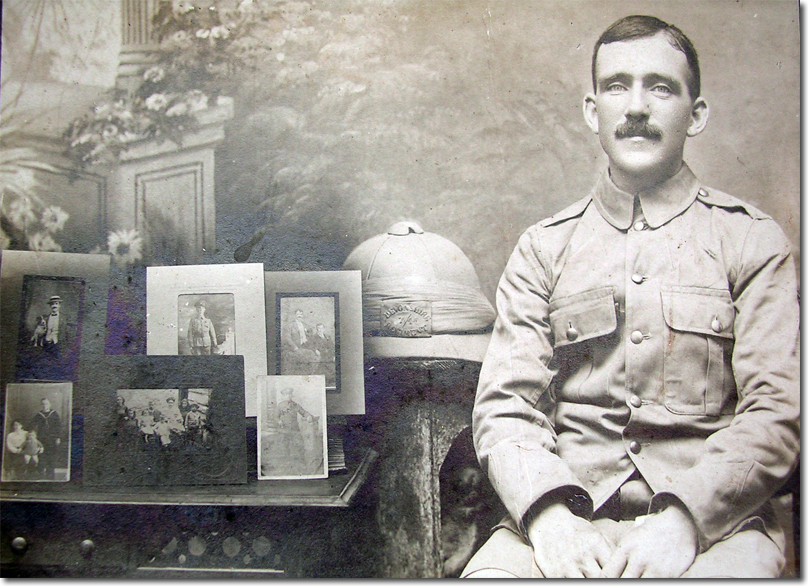|
|


|
|
This photograph is of a soldier of the 1st/4th Devon (Territorials). They were originally sent to the North West Frontier to relieve experienced troops to fight elsewhere. However. with the unfolding disaster Kut al Amara in Mesopotamia, they were moved to Basra in March 1916. They remained in Mesopotamia for the rest of the war and in to the early years of the new found colony of Iraq.
From February 1917 they moved to Amara and came under orders of the Tigris Lines of Communication. It is possibly in this role that a certain T.E. Lawrence wrote about them in his famous Seven Pillars of Wisdom book. I went up the Tigris with one hundred Devon Territorials, young, clean, delightful fellows, full of the power of happiness and of making women and children glad. By them one saw vividly how great it was to be their kin, and English. And we were casting them by thousands into the fire to the worst of deaths, not to win the war but that the corn and rice and oil of Mesopotamia might be ours. For all we know, the man in this photograph was one of those Territorials that Lawrence of Arabia was so taken by. And one does wonder if this positive view of the Devon soldiers motivated him later to move to Devon to work at RAF Mountbatten. It would also appear that he was not the first passenger to enjoy the company of soldiers from Devon along the Tigris. Back in 1916 when troops from the Sixth Battalion of the Devonshire Regiment (Regulars rather than Territorials) were attempting to relieve Kut Al Amara from the Turks. Colonel G B Oerton wrote that the conditions in Mesopotamia were indescribable. It was common for temperatures to reach 120 degrees Fahrenheit (about 49 degrees Celsius). The arid desert, regular flooding; flies, mosquitoes and other vermin led to appalling levels of sickness and death through disease. There was a shortage of officers and men, and many of the reinforcements were half-trained and ill-equipped. He described the march from Basra to El Orah as 230 miles of mud, filth, cold, starvation and desolation. The men were on half rations, a tin of bully (corned beef) and two biscuits a day. Occasionally they might have a tin of Australian jam. They had no fuel but even if they had it was impossible to light fires anyway. The men often lay in the mud all night without cover of any kind. The Mahelas (local boats) were unable to get tents and rations to the soldiers because the banks of the River Tigris were flooded and the river was full of bends which proved to be too much for the boats. He described how moved he was listening to the boys singing "The Farmers Boy", "One Man went to Mow" and "Widecombe Fair" as they almost fought their way along the banks of the Tigris. He remarked on how cheerful and unselfish they were, turning everything into a laugh, helping and carrying the rifles of their weaker pals. He also wrote of Sergeant George who had a wonderful singing voice and how he helped to lift the spirits of the men. This battalion would take terrible casualties as they desperately attempted to relieve Kut al Amara. It fell just a few weeks later. Image courtesy of hliguy |
Armed Forces | Art and Culture | Articles | Biographies | Colonies | Discussion | Glossary | Home | Library | Links | Map Room | Sources and Media | Science and Technology | Search | Student Zone | Timelines | TV & Film | Wargames